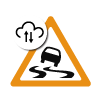Connected safety
Your car can communicate information with other cars on the road, which can help you to be aware of or avoid accidents or traffic jams further up the road. This feature is called connected safety.
Through an internet connection, your car and other cars on the same road can share information about accidents, slippery road conditions and other situations that may cause activation of the hazard warning lights.
Connected safety can be enabled or disabled in privacy settings.
Never rely on connected safety warnings by the car to be a replacement for safe driving practices. Drive the car with the same attention to safety as required by a car without this feature.Warning
Connected safety warnings
Depending on the nature of the information your car receives from other road users, one of these two symbols can be shown in the driver display:
 | A vehicle's hazard warning lights have been activated further up the road. |
 | Slippery road conditions are detected further up the road. |
Warnings from connected safety can also be shown in the head-up display.Tip
Conditions and limitations
Connected safety relies on communication between your car and other vehicles on the road. This communication relies on a number of conditions, such as:
- The connected safety feature must be enabled in settings.
- Connected safety must be available to the other road users.
- The involved cars must be connected to the internet. A weak or no internet connection can disable the feature until the connection is improved.
- The road you're on is in the Volvo Cars database.
A slippery road may not always result in a warning from connected safety, as your car or other connected road users may not experience the road conditions as such. Low-friction situations between the tyres and road surface are often used as markers to identify a slippery road. Low-traction manoeuvres, such as slight steering, braking or acceleration, rarely cause low-friction situations. Therefore, it might prove difficult to identify the road as slippery during such manoeuvres.Note